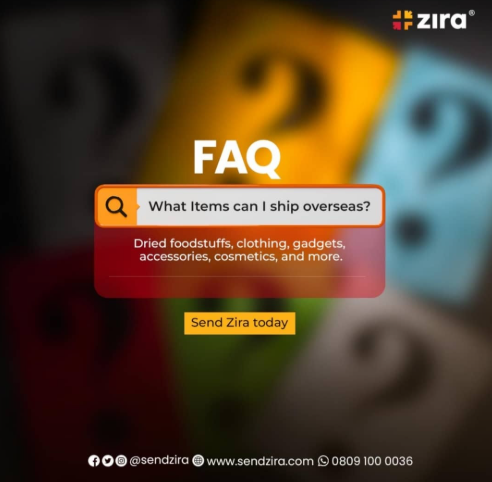How to Ship Nigerian Food Internationally: Foods You Can and Can't Send

Missing the taste of home while living abroad? Wondering “can food be shipped internationally” so you can enjoy your favorite Nigerian delicacies? The good news is yes – you can ship many Nigerian food overseas, but there are important rules and restrictions you need to know.
Whether you want to send homemade food overseas to family or need to know what snacks you can send overseas, this guide covers everything about shipping Nigerian foods internationally.
Before we dive into the details, let me introduce you to SendZira: we specialize in safe, reliable food shipping from Nigeria to destinations worldwide. From dried pepper soup ingredients to your favorite chin chin, we handle food shipments with the care and expertise your precious packages deserve.

Can You Ship Food Internationally? The Basics
Yes, you can ship food items internationally, but not all foods are allowed. The key question isn’t just “can you ship food abroad” but rather “what kind of food can you ship internationally” safely and legally.
The golden rule: Non-perishable foods have the best chance of reaching their destination successfully. Fresh, frozen, or perishable items face strict restrictions and often get rejected at customs.
What Food Items Are Allowed Into Different Countries?
What Food Items Are Allowed Into the UK from Nigeria?
The UK has specific regulations for food imports from Nigeria:
Generally Allowed:
Dried and processed foods
Commercially packaged snacks
Spices and seasonings
Non-perishable items in sealed packaging
Restricted or Prohibited:
Fresh fruits and vegetables
Raw or cooked meat products
Dairy products
Foods containing meat or dairy
Other Popular Destinations
USA: Similar restrictions to UK, with strict rules against meat, dairy, and fresh produce Canada: Allows many processed foods but prohibits meat, dairy, and fresh items European Union: Generally follows UK-style regulations with country-specific variations
Always check current regulations for your specific destination, as rules can change.
Food You Can Ship Abroad from Nigeria
Here are Nigerian foods that typically ship well internationally:
Flours and Powders
Garri – The ultimate Nigerian staple that ships beautifully
Yam flour (elubo) – Perfect for making amala overseas
Plantain flour – Great for baking and traditional recipes
Cocoyam powder – Excellent for making fufu
Powdered milk – If commercially packaged
Dried Goods That Travel Well
Dried pepper soup ingredients – Your essential spices in one package
Dried vegetables – Bitter leaf, scent leaf, and other traditional leaves
Dried seafood – Shawa, bonga fish, and other favorites
Dried fruits – Including dry breadfruit (ukpa)
Dried beans – Various Nigerian bean varieties
Melon seeds (egusi) – Essential for making egusi soup
Popular Nigerian Snacks You Can Send Overseas
Chin chin – The beloved crunchy treat that ships perfectly
Kokoro – Spicy corn snacks that survive long journeys
Plantain chips – Crispy and delicious, travels well
Kilishi – Nigerian dried meat snack (check destination restrictions)
Packaged biscuits – Commercially made varieties
Groundnuts (peanuts) – Raw or roasted
Essential Spices and Seasonings
Suya spice – Bring that authentic suya flavor anywhere
Jollof rice spice – For perfect jollof every time
Curry powder – Nigerian-style curry blends
Dried thyme – Essential for Nigerian cooking
Locust beans – Properly dried and packaged
Foods You Cannot Ship Internationally
Understanding what you cannot send is just as important as knowing what you can ship:
Always Prohibited
Fresh meat, fish, or poultry – Including fresh kilishi
Fresh fruits and vegetables – Even dried versions may face restrictions
Dairy products – Milk, cheese, yogurt
Cooked foods – Including ready-to-eat meals
Foods with meat or dairy ingredients – Check ingredient lists carefully
Items Requiring Special Permits
Honey and bee products
Some traditional medicines
Certain plant-based products
Can You Ship Non-Perishable Food Internationally?
Absolutely! Non-perishable foods are your best bet for successful international shipping. Focus on items that:
Don’t require refrigeration
Have long shelf lives
Come in sealed, moisture-proof packaging
Are commercially produced when possible
How to Send Homemade Food Overseas
While challenging, you can sometimes ship homemade Nigerian foods if you follow these guidelines:
Best homemade items to ship:
Properly dried and packaged chin chin
Homemade spice blends in sealed containers
Dried and ground ingredients
Important considerations:
Package in airtight, professional containers
Label all ingredients clearly in English
Research destination country requirements
Consider shelf-life during transit
General Guidelines for Shipping Food Successfully
Non-Perishable is Key
Focus on foods that don’t require refrigeration or freezing, as these are most likely to be accepted by customs.
Proper Packaging
Use airtight containers to prevent moisture and spoilage
Vacuum-seal items like dried seafood or locust beans to preserve freshness and extend shelf life
Securely seal all packages to prevent spilling during transit
Clear Labeling
Clearly label all ingredients in English for customs inspections
Include expiration dates where applicable
Mark packages as “Food Products” clearly
Destination Regulations
Research and adhere to the specific customs and shipping regulations of the country you are shipping to
Rules vary significantly between countries
When in doubt, contact customs authorities
Documentation
Obtain necessary regulatory documents, such as a phytosanitary certificate, which may be required for international food shipments
Keep receipts and packaging information
Provide detailed contents lists
Can You Send Food in the Mail Internationally?
Yes, but with important limitations:
Postal service restrictions:
Most postal services have strict food policies
Private couriers often have more flexible food shipping options
Commercial food shippers specialize in navigating regulations
Best practices:
Use experienced food shipping services
Declare all contents honestly
Package professionally to prevent damage
What Kind of Food Can You Send Overseas: Quick Reference
✅ Generally Safe to Ship:
Garri, yam flour, and other flours
Dried spices and seasonings
Commercially packaged snacks
Vacuum-sealed dried goods
Properly packaged traditional ingredients
❌ Avoid Shipping:
Anything fresh or perishable
Cooked or prepared meals
Items containing meat or dairy
Foods requiring refrigeration
Tips for Successful Food Shipping
Start with small test shipments to learn what works
Use professional packaging – proper containers matter
Ship during cooler months when possible
Track your shipments to monitor delivery
Work with experienced shippers who understand food regulations
Why Choose Professional Food Shipping Services
While you can attempt to ship foods yourself, professional services like SendZira offer significant advantages:
Knowledge of current regulations across different countries
Proper packaging techniques that maximize success rates
Experience handling customs and documentation
Insurance options for valuable food shipments
Reliable tracking and delivery confirmation
Making Your Food Shipping Dreams Come True
Shipping Nigerian food internationally is definitely possible when done correctly. The key is understanding what you can ship, how to package it properly, and working with services that specialize in international food delivery.
Whether you’re craving that perfect bowl of garri or need to send chin chin to family overseas, the right approach makes all the difference. Don’t let distance prevent you from enjoying the flavors of home or sharing them with loved ones abroad.
Ready to send your favorite Nigerian foods internationally?
Call/WhatsApp: 0809 100 0036
Email: info@sendzira.com
Let SendZira handle the complexities of international food shipping while you focus on choosing the perfect items to send. Your taste of home is just a shipment away!
